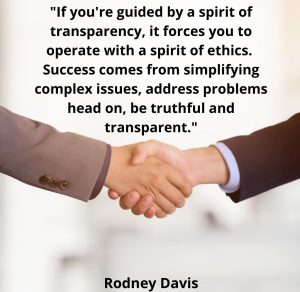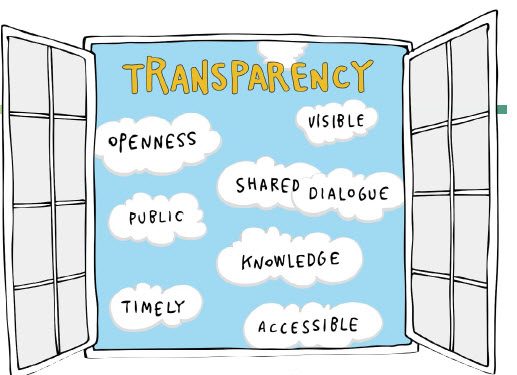Transparency is not always something you hear in relation to business, but it is quickly becoming the norm. The Business Dictionary defines transparency as a “lack of hidden agendas or conditions, accompanied by the availability for full information required of collaboration, cooperation, and collective decision making”. So what does that mean? And why should you incorporate it into your business model?
Contents
Transparency Builds Trust
In the age of the internet, consumers do not always know what the truth is. With data breaches, misinformation, and fake news everywhere you look on the internet, it’s necessary to maintain a degree of trust. That’s why businesses who are transparent are so appealing. Sprout Social conducted a survey of 1,000 U.S. consumers on their transparency beliefs, expectations, and desires. Here’s what they found:

- 85% of people say a business’ history of being transparent makes them more likely to give it a second chance after a bad experience.
- 85% are more likely to stick by a business during a brand crisis if it has a history of being transparent.
- 89% say a business can regain their trust if it admits to a mistake and is transparent about the steps it will take to resolve the issue.
Transparency in Hiring
It’s crucial to be upfront with your employees from the time you hire them. An efficient way to jumpstart this is to develop training programs for new employees. People need to be fully vested for them to apply themselves to achieve company goals. Therefore, aligning themselves with the values, vision, and mission of the company from the start will give everyone an advantage. This will also further establish personal connections and responsibility towards the company. Using this practice in hiring can be especially helpful because it will aid in differentiating between those who want to contribute to the betterment of the company as a whole, and those who won’t. This will also tie into the quality of work you get from employees. When someone feels they are a part of something bigger, they will put in more effort and maintain productivity for longer.

Building Connections by Being Transparent
Once you’ve found employees who are genuinely interested in the company, you can move on to internal transparent practices. Ensuring that everyone feels they have a voice will go a long way in developing your business. With transparency, you can identify each employee’s strengths and leverage them to handle more complex problems. This not only transcends traditional job structure, but it allows the flow of innovative and creative new ideas to be expressed.

Harvard Business Review’s 2013 employee engagement survey revealed that 70% of those surveyed say they’re most engaged when senior leadership continually updates and communicates company strategy. When you give everyone the necessary tools to succeed, you will receive an abundance of new ideas and perspectives. In turn, with new ideas flowing in from all angles, this will also help you get ahead in the marketplace.
Finding the Right Degree of Transparency
It is important to consider exactly how transparent you will become. Before you start, it’s important to remember the difference between transparency and confidentiality. It’s also vital to communicate within your company before sharing anything externally. That being said, there are many ways to be open and honest without revealing any critical data. Try sharing something small first, like your hiring process. Then move onto something bigger; this can be gross revenue, dollar by dollar spending, staff salaries, etc. Buffer is a great example of a positive result of incorporating transparency. They have even developed guidelines for others to follow suit. Or, if your business has been around for a while, see how Fog Creek did it–by releasing teams’ salaries after 17 years.
Try sharing something small first, like your hiring process. Then move onto something bigger; this can be gross revenue, dollar by dollar spending, staff salaries, etc. Buffer is a great example of a positive result of incorporating transparency. They have even developed guidelines for others to follow suit. Or, if your business has been around for a while, see how Fog Creek did it–by releasing teams’ salaries after 17 years.
Be Proactive, Not Reactive
Clearly, there are many benefits to being transparent in your business. Transparency builds trust, increases healthy communication, and boosts innovation. Not to mention, it could end up being the deciding factor between your business and competitors’. By always being transparent, you’re conveying to consumers that you care about relaying the truth, even when it’s difficult.


